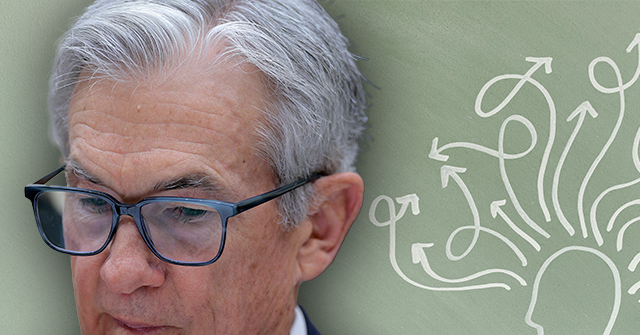Inflation by Assumption: The Fed’s Tariff Shortcut
Federal Reserve Chairman Jerome Powell made headlines last week when he warned that new tariffs could push prices higher, remarking: “Everyone I know is forecasting a meaningful increase on prices from tariffs because someone has to pay for the tariffs.”
That may be true of Powell’s circle, but it’s not true of the data. And if Powell is drawing his view from the latest Federal Reserve research, he may be misled by a model that appears far more rigorous than it really is.
A new working paper from the Boston Fed claims that nearly all of the cost of the 2018–2019 tariffs on Chinese imports was passed on to consumers and that the tariffs raised core PCE inflation by 0.3 to 0.4 percentage points annually. The implication, of course, is that Trump’s new “Liberation Day” tariffs would do the same.
But there’s a problem: the paper’s headline finding is less a discovery than a self-fulfilling assumption.
The Model Assumes Profit Margins Don’t Change
Rather than examining actual pricing behavior by firms, the authors built a model in which firms are assumed to maintain fixed markups over their marginal costs. So, when a tariff raises input costs, retail prices mechanically rise. The pass-through isn’t something the model discovers. It’s something the model guarantees.
In other words, the paper doesn’t prove that tariffs caused inflation. It assumes that they did and then reports the inflation its own assumptions require.
Just as troubling, the authors make no attempt to compare the pricing behavior of tariffed goods to that of non-tariffed goods. Instead, they look at product categories with large import shares and simply attribute any observed rise in prices to tariffs. But inflation was already picking up in the period they study, in part because the Fed was actively trying to hit its two percent target. If all prices in the economy were rising at the same pace, the authors would still report tariff-driven inflation—because their model includes no counterfactual.
This makes the result almost impossible to falsify. If prices rise, it’s proof of pass-through. If prices rise equally in every sector, it’s still proof of pass-through. If inflation accelerates due to monetary policy, that’s also counted as pass-through. The conclusion is built into the method.
To be fair, the authors do use actual price data at the PCE category level. But they make no use of microdata on firm-level pricing or margins. They do not test whether retailers compressed margins to maintain prices. They do not ask whether importers switched suppliers. They do not ask whether Chinese exporters adjusted prices to retain U.S. market share. All of these were observed in other research on the 2018 tariffs. Here, they’re left out.
A History of Flawed Tariff Inflation Studies
This kind of circular logic isn’t new. It’s part of a broader pattern in the Federal Reserve’s treatment of trade policy.
In 2019, a New York Fed blog post claimed the full burden of tariffs was falling on U.S. consumers. But as we pointed out at the time, the evidence came entirely from customs data on import prices—not from retail prices or margin data. The conclusion relied on the assumption that import prices feed directly into consumer prices, an assumption that was never tested. Months later, even the Fed acknowledged that their price estimates could be distorted by customs valuation quirks and accounting practices.
That same year, the New York Fed issued a paper arguing that tariffs imposed large welfare losses on the U.S. economy, based on a 10-day window around tariff announcements. But the market quickly rebounded, and the macro data showed little sign of strain. As we pointed out, if you used a 15-day window around the announcements, the same method would show that stocks rose. Same thing if you used a 20-day, 30-day, or 60-day window. The supposed cost to the U.S. economy was simply an artifact of the narrow focus on the 10-day window.
More recently, however, not all Fed research has made these errors. A March 2025 study by Atlanta Fed economists took a more grounded approach, using actual category-level PCE price data and making no assumption of full pass-through. That study found only modest, one-time price effects from hypothetical new tariffs—effects comparable to a small consumption tax, not an inflationary spiral. It also stressed that the degree of pass-through would depend on market structure, competition, and substitution—not just theory.
Likewise, a 2025 paper published in AEJ: Insights found that much of the 2018 tariffs were absorbed by U.S. retailers rather than passed on to consumers. This lined up with what many consumers experienced: prices held steady even as tariffs rose. That paper relied on actual retail scanner data, not modeling assumptions.
This is the context in which we should read the Boston Fed’s latest entry. It doesn’t reflect an emerging consensus. It revives an old assumption. It doesn’t challenge the data. It sidesteps it. And it doesn’t help policymakers understand the real-world effects of tariffs. It only helps justify the priors they already held.
The question of who pays for tariffs is too important to be left to circular models and assumption-driven simulations. If Powell is taking this as evidence that Trump’s tariffs will be inflationary, he’s not following the evidence. He’s following a script.
Read the full article here
